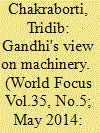|
|
|
Sort Order |
|
|
|
Items / Page
|
|
|
|
|
|
|
| Srl | Item |
| 1 |
ID:
058231


|
|
|
|
|
| Publication |
New Delhi, Tulika, 2001.
|
| Description |
viii, 283p.Hbk
|
| Standard Number |
8185229414
|
|
|
|
|
|
|
|
|
|
|
|
Copies: C:1/I:0,R:0,Q:0
Circulation
| Accession# | Call# | Current Location | Status | Policy | Location |
| 044514 | 954.03/GUP 044514 | Main | On Shelf | General | |
|
|
|
|
| 2 |
ID:
155917


|
|
|
|
|
| Summary/Abstract |
This article analyses the role of the legal profession and the evolution of aspects of Indian nationalist ideology during the Non-Cooperation Movement of 1920–22. Very few legal professionals responded to Gandhi's call to boycott the British courts despite significant efforts to establish alternative institutions dedicated to resolving disputes. First identified by leading legal professionals in the movement as courts of arbitration, these alternative sites of justice quickly assumed the name ‘panchayats’. Ultimately, this panchayat experiment failed due to a combination of apathy, repression, and internal opposition. However, the introduction of the panchayat into the discourse of Indian nationalism ultimately had profound effects, including the much later adoption of constitutional panchayati raj. Yet this discourse was then and remains today a contested one. This is largely a legacy of Gandhi himself, who, during the Non-Cooperation Movement, imagined the panchayat as a judicial institution based upon arbitration and mediation. Yet, after the movement's failure, he came to believe the panchayat was best suited to functioning as a unit of village governance and administration.
|
|
|
|
|
|
|
|
|
|
|
|
|
|
|
|
| 3 |
ID:
130791


|
|
|
|
|
| Publication |
2014.
|
| Summary/Abstract |
Mahatma Gandhi held a distinctive place in the history of Indian freedom movement as well as in the
momentous evolution from tradition to modernity. During the time-period ranging from l9l6 to 1947,
Gandhi had revealed his luminous dexterity and methods which made him the vanguard of the nation,
by the relentless logic of history. He was an iconoclast. Who quivered the basics of the powerful British Empire in India through multiple novel means such as non- violent, satyagraha, . Fasting, hartals, non'-cooperation and mass civil disobedience. Gandhi was a multifaceted virtuoso who applied his mind to glitches of human distress. His social ideas amply exhibited a deep and abiding consciousness of the fundamental reformation of the Indian society. In the economic sphere, he ardently believed that the economic salvation of India exclusively depended on the economic regeneration of vast millions of Indians living in the rural areas. ln line with such a policy. he championed the promotion of small scale village and cottage industries, which could offer productive employment on a long-term basis to the common masses of India. At the political level, Gandhi felt that the state was a means of intimidation, since it was likely to demoralize the cherished essential freedom of individuals. As an individualist, Gandhi judged that individuals could enhance their traits through truth and non-violence, drenched with an ambience of freedom.
|
|
|
|
|
|
|
|
|
|
|
|
|
|
|
|
| 4 |
ID:
189624


|
|
|
|
|
| Summary/Abstract |
Prime Minister of India, Narendra Modi rightly echoed the personality of Patel at the inauguration of Sardar Patel Statue,‘Sardar Patel used Kautilya’s wisdom and Shivaji Maharaj’s bravery to achieve the great feat of uniting India after partition’. Undoubtedly, Kutch to Kohima, or Kanyakumari—if we can travel freely today across the beautiful and bountiful lands of India, it is because of Sardar Vallabhbhai Patel.
|
|
|
|
|
|
|
|
|
|
|
|
|
|
|
|
|
|
|
|
|